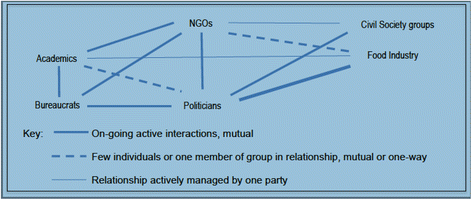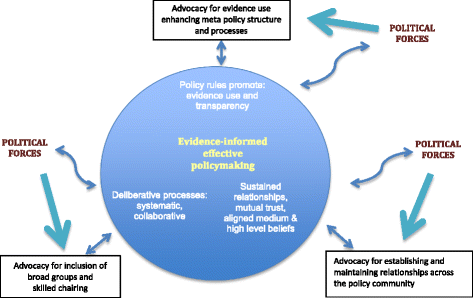Enhancing evidence use in public health nutrition policymaking: theoretical insights from a New Zealand case study
- PMID: 27887613
- PMCID: PMC5124286
- DOI: 10.1186/s12961-016-0154-8
Enhancing evidence use in public health nutrition policymaking: theoretical insights from a New Zealand case study
Abstract
Background: Enhancing the use of evidence in policymaking is critical to addressing the global burden of nutrition-related disease. Whilst the public health nutrition community has embraced evidence-informed policymaking, their approach of defining relevant evidence and evaluating policy has not brought about major shifts in policymaking. This article uses a public health nutrition case study to refine a novel theory-informed framework for enhancing the use of evidence in government public health nutrition policymaking. Our aim is to contribute insights from evidence-informed policy to the emerging paradigm in public health nutrition policymaking.
Methods: An enquiry framework informed by three groups of theories underpinning evidence-informed policy was used to explore the role of socially mediated processes on the use of evidence. A public health nutrition case study on food marketing to New Zealand children was conducted to refine the framework. Interview data collected from 54 individuals representing four key policy stakeholder groups, policymakers, academics, and food industry and non-government organisations were analysed using deductive and inductive thematic analysis. To enhance theoretical robustness, an alternative hypothesis of political explanations for evidence use was explored alongside the enquiry framework.
Results: We found the prevailing political climate influenced the impact of advocacy for evidence inclusive processes at the meta-policy and policymaking process levels and in policy community relationships. Low levels of awareness of the impact of these processes on evidence use and uncoordinated advocacy resulted in the perpetuation of ad hoc policymaking. These findings informed refinements to the enquiry framework.
Conclusion: Our study highlights the role advocates can play in shifting government public health nutrition policymaking systems towards enhanced use of evidence. Our Advocacy for Evidence Use framework argues for a three-channel approach to advocacy for using evidence in the public interest. The framework provides a means for building a constituency for evidence use in public health nutrition and adds understanding about advocacy to the field of evidence-informed policy. Future research should examine the impact of coordinated advocacy on public health nutrition policymaking systems.
Keywords: Advocacy; Evidence use; Policy; Public health nutrition.
Figures
Similar articles
-
Exploring the dynamics of food-related policymaking processes and evidence use in Fiji using systems thinking.Health Res Policy Syst. 2017 Aug 29;15(1):74. doi: 10.1186/s12961-017-0240-6. Health Res Policy Syst. 2017. PMID: 28851398 Free PMC article.
-
Constituent-driven health policy informed by policy advocacy literature.Transl Behav Med. 2023 May 13;13(5):338-342. doi: 10.1093/tbm/ibac116. Transl Behav Med. 2023. PMID: 36694934 Review.
-
An integrated framework to guide evidence-informed public health policymaking.J Public Health Policy. 2025 Mar;46(1):193-210. doi: 10.1057/s41271-024-00535-9. Epub 2025 Jan 11. J Public Health Policy. 2025. PMID: 39799247 Free PMC article. Review.
-
Examining the use of health systems and policy research in the health policymaking process in Israel: views of researchers.Health Res Policy Syst. 2016 Sep 1;14(1):66. doi: 10.1186/s12961-016-0139-7. Health Res Policy Syst. 2016. PMID: 27585630 Free PMC article.
-
Research evidence and policy: qualitative study in selected provinces in South Africa and Cameroon.Implement Sci. 2015 Sep 3;10:126. doi: 10.1186/s13012-015-0315-0. Implement Sci. 2015. PMID: 26334760 Free PMC article.
Cited by
-
Individual and institutional capacity-building for evidence-informed health policy-making in Iran: a mix of local and global evidence.Health Res Policy Syst. 2022 Feb 12;20(1):18. doi: 10.1186/s12961-022-00816-3. Health Res Policy Syst. 2022. PMID: 35151312 Free PMC article.
-
Governing evidence use in the nutrition policy process: evidence and lessons from the 2020 Canada food guide.Nutr Rev. 2022 Feb 10;80(3):467-478. doi: 10.1093/nutrit/nuab105. Nutr Rev. 2022. PMID: 35043195 Free PMC article.
-
Evaluating the Energy and Core Nutrients of Condiments in China.Nutrients. 2023 Oct 12;15(20):4346. doi: 10.3390/nu15204346. Nutrients. 2023. PMID: 37892422 Free PMC article.
References
-
- GBD 2013 Risk Factors Collaborators. Forouzanfar MH, Alexander L, Anderson HR, Bachman VF, Biryukov S, Brauer M, Burnett R, Casey D, Coates MM, Cohen A, et al. Global, regional, and national comparative risk assessment of 79 behavioural, environmental and occupational, and metabolic risks or clusters of risks in 188 countries, 1990–2013: a systematic analysis for the Global Burden of Disease Study 2013. Lancet. 2015;386(10010):2287–323. doi: 10.1016/S0140-6736(15)00128-2. - DOI - PMC - PubMed
-
- Ng M, Fleming T, Robinson M, Thomson B, Graetz N, Margono C, Mullany EC, Biryukov S, Abbafati C, Abera SF, et al. Global, regional, and national prevalence of overweight and obesity in children and adults during 1980–2013: a systematic analysis for the Global Burden of Disease Study 2013. Lancet. 2014;384(9945):766–81. doi: 10.1016/S0140-6736(14)60460-8. - DOI - PMC - PubMed
-
- Ministry of Health. Annual Update of Key Results 2014/15: New Zealand Health Survey. Wellington: Ministry of Health; 2015. p. 67
-
- Rayner G, Lang T. Ecological Public Health: Reshaping the Conditions for Good Health. London and New York: Taylor & Francis; 2012.
MeSH terms
LinkOut - more resources
Full Text Sources
Other Literature Sources



